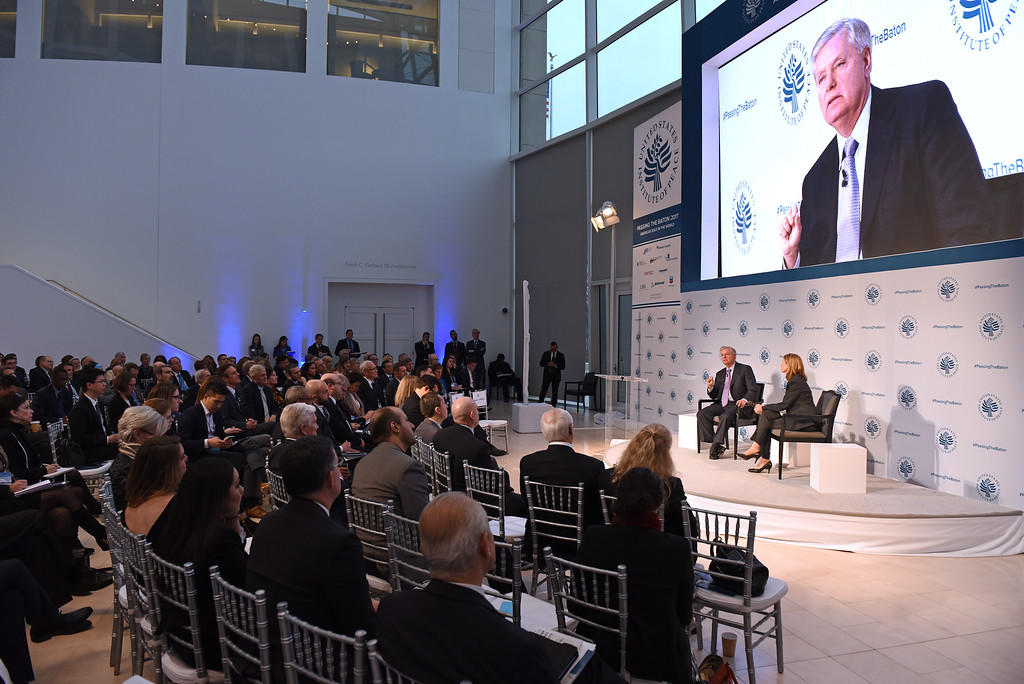Passing the Baton 2017: America's Role in the World
Read the Event CoverageAs the United States prepared to inaugurate its 45th president, the U.S. Institute of Peace again held its Passing the Baton conference—a review, during the transition between administrations, of global challenges confronting our nation. USIP convened Cabinet-level and other senior foreign policy and national security figures from the outgoing and incoming administrations as part of two days of meetings January 9 and 10. They were joined by top officials from previous administrations, thought leaders and other foreign policy experts.

This third Passing the Baton sought vital common ground on U.S. foreign policy. In accord with USIP’s congressional mandate, it sought to advance informed, bipartisan problem-solving on threats to U.S. national interests and international peace—from wars and extremist violence to global environmental, nuclear, cyber-security and other threats. In hosting this event, USIP partnered with five prominent think tanks: the American Enterprise Institute, the Atlantic Council, the Carnegie Endowment for International Peace, the Center for American Progress and the Heritage Foundation. Media partners for the Passing the Baton were Politico and SiriusXM Radio.
USIP first held Passing the Baton in 2001 as part of the transition between the administrations of Presidents Bill Clinton and George W. Bush. In 2009, the conference took place as President Bush transferred power to President Barack Obama.
Passing the Baton 2017 started January 9 with private meetings, including members of the outgoing and incoming foreign policy teams. They were hosted by former Secretary of State Madeleine Albright, former Deputy Secretary of State William J. Burns, former national security advisors Stephen Hadley and Zbigniew Brzezinski, and National Security Advisor Susan Rice. Dinner host former Secretary of Defense William Perry was ill and was represented instead by former Undersecretary of Defense for Policy Eric Edelman.
A conference the following day, open to news media and on the record, featured Secretary of State John Kerry and other officials from the current and former administrations, as well as President-elect Donald Trump’s designated national security advisor, Lt. Gen. Michael Flynn, and his designated deputy, KT McFarland. Speakers also included members of Congress and policy experts. During the event, National Security Advisor Rice addressed the audience before ceremonially “passing the baton” to her designated successor, Lt. Gen. Flynn.
More on Passing the Baton
Passing the Baton, a history
The Passing the Baton conference is a broad and bipartisan review of the global challenges confronting our nation during a transition between U.S. presidential administrations. It gathers senior members of the foreign policy and national security teams from outgoing, incoming and previous administrations, along with outside scholars and experts.
Foreign Policy Priorities for the Trump Administration
In this series of brief video interviews, four U.S. Institute of Peace experts offer their recommendations. They spoke ahead of USIP’s Passing the Baton conference, which will convene Cabinet-level and other senior foreign policy and national security figures from the outgoing and incoming administrations for meetings on January 9 and 10.
"Yes, a Bipartisan Foreign Policy Is Possible"
Even Now With dangers growing around the world, it's more urgent than ever
An op-ed from Politico Magazine jointly authored by Madeleine Albright, Stephen Hadley and Nancy Lindborg
Trump & Obama Aides, Experts Weigh America’s Global Role
A Bipartisan Consensus amid Transition: Buttress U.S. Leadership
A readout from private meetings among national security aides from the outgoing, incoming and past administraions, and independent experts.
From the Jan 10 event
- Agenda
- Speakers & panelists
- Passing the Baton and the transition in the news
- Updates during the day
- The day in videos
- Transcript of Ambassador Rice's remarks
- Transcript of Lt. Gen. Michael Flynn's remarks
Read an overview of the event, U.S. National Security Chiefs Talk Leadership, Partners
Read recaps of the main sessions:
- Secretary Kerry Defends Obama Foreign Policy
- Agenda: ‘Global System,’ Cyber War, Defense—and Tweets
- On Security, Expect Surprise, Plan for the Shocks
- Senator Graham Urges Trump to Back Development Aid
- Flynn Thanks Rice, Affirms Value of U.S. Allies
- Cooling Iraq’s Conflict With Community Dialogue
- 'Political Peace' Is Possible, Says AEI President
- Will the Trump Era Uphold U.S. Global Leadership?



